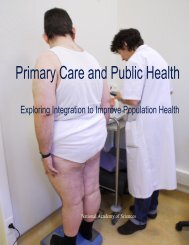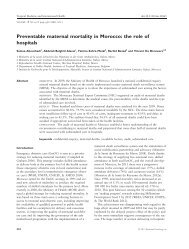Preventing Childhood Obesity - Evidence Policy and Practice.pdf
Preventing Childhood Obesity - Evidence Policy and Practice.pdf
Preventing Childhood Obesity - Evidence Policy and Practice.pdf
You also want an ePaper? Increase the reach of your titles
YUMPU automatically turns print PDFs into web optimized ePapers that Google loves.
CHAPTER 25<br />
Developing the political climate for action<br />
Philip James 1,2 <strong>and</strong> Neville Rigby 1<br />
1 International Association for the Study of <strong>Obesity</strong>, London, UK<br />
2 Neville Rigby & Associates, London, UK<br />
Summary <strong>and</strong> recommendations<br />
for practice<br />
Key elements in converting academic<br />
analyses into policy implementation<br />
• Prepare groundwork by producing coherent evidence,<br />
reports <strong>and</strong> briefing papers, to promote<br />
public <strong>and</strong> political awareness.<br />
• Develop a broad consensus among eminent scientific/medical<br />
leaders; anticipate poor support from<br />
many clinicians with political ambitions <strong>and</strong> little<br />
underst<strong>and</strong>ing of public policies.<br />
• Engage openly with the media; focus on opinion<br />
leaders. Repeatedly explain the issues willingly <strong>and</strong><br />
patiently.<br />
• Be ready for confrontation from opposing viewpoints<br />
<strong>and</strong> prepare reasoned responses developing<br />
new work to answer the challenges.<br />
• Create a movement by engaging different societal<br />
<strong>and</strong> academic groups with established political connections<br />
to agree the main consensus not the detail.<br />
• Remember that political change takes time <strong>and</strong><br />
depends on a crisis or incessant vocal public <strong>and</strong><br />
expert lobbying.<br />
• Focus on finance — health ministries are weak: other<br />
ministers or the prime minister make decisions<br />
affecting other sectors, based on economic arguments<br />
<strong>and</strong> political pressure.<br />
Introduction<br />
Public health initiatives require a sophisticated<br />
underst<strong>and</strong>ing, not only of medical concerns, but<br />
<strong>Preventing</strong> <strong>Childhood</strong> <strong>Obesity</strong>. Edited by<br />
E. Waters, B.A. Swinburn, J.C. Seidell <strong>and</strong> R. Uauy.<br />
© 2010 Blackwell Publishing.<br />
also of political issues in order to appreciate why<br />
some initiatives succeed <strong>and</strong> others do not. The<br />
national response to health needs is often delayed.<br />
Examples of this delay include the slow reaction to<br />
the HIV contamination of recombinant factor 8<br />
plasma transfusions for hemophiliacs, <strong>and</strong> the<br />
extremely slow response to the emergence of the<br />
HIV/Aids epidemic. Similarly, the need to take<br />
action in response to the huge death <strong>and</strong> disability<br />
rates from coronary heart disease ( CHD ) was<br />
ignored for years by many governments, allegedly on<br />
the grounds that the scientific <strong>and</strong> medical communities<br />
could not agree that a clear link existed<br />
between CHD <strong>and</strong> high blood cholesterol levels,<br />
induced by saturated fat intakes, high blood pressure<br />
<strong>and</strong> smoking. Even if this could be proved, inaction<br />
was justified by the view that it was the individual ’ s<br />
own responsibility to change his or her diet <strong>and</strong><br />
lifestyle. The government ’ s role was seen as simply<br />
providing health promotion messages to enable<br />
consumers to make “ informed ” food choices. The<br />
huge agricultural <strong>and</strong> food industries recognized<br />
that they had to show concern for their customers<br />
<strong>and</strong> a vague health educational message suited<br />
their interests because their profits often depended<br />
on continuing to sell high saturated fat - filled<br />
products.<br />
Given that it has taken several decades to see major<br />
international initiatives even on tobacco, how do we<br />
create the political will for action to be taken? We<br />
conclude that the triggers owe less to a clear underst<strong>and</strong>ing<br />
of the science, or even evidence for the benefits<br />
of change, than to a political need to respond<br />
publicly to an issue of pressing public concern. We<br />
illustrate this from our own experience of political<br />
responses to UK <strong>and</strong> global health concerns since the<br />
mid - 1970s.<br />
212

















